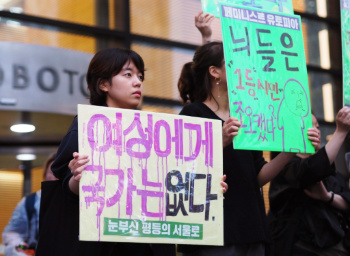
Lee Joo-young met with Ewha Voice in an eye-opening interview uncovering her efforts to re-invigorate Korean politics. A member of Green Party Korea, she maintained that with renewed diversity and grassroots democracy, the Korean political scene may become more accepting.
As an undergraduate in political science, Lee was hardly interested in politics, and even thought that it had nothing to do with her. The image that she conjured of a politician was not who she was.
However she realized that one did not need a big name to be involved in politics. She decided to take matters into her own hands. Once she had entered the party, she realized that the party’s mottos on political diversity and gender equality, among others also suited her value systems.
“Diversity in the representation of our political candidates is highly important – in fact the Green Party has a very balanced demographic including that of teenagers and female members,” she added.
The Green Party does not have a central administrative body like that of other major parties such as the ruling democratic party. Instead, it believes in a bottom-toup grassroots democracy, where change starts from localities. As a member of the Seocho-Gangnam District of the Green Party, Lee thought she could start off with running for district mayor.
“After all, many of the issues confronted by the SeochoGangnam District, such as the management of major residential re-construction sites, are yet to be shaped into policies,” she maintained.
Even though Lee clearly saw where work could be done, she was afraid of her identity as a woman in her 20s running against middle-aged men, who have dominated Korean political thus far. Nevertheless, she decided to run because it was the only way she could show others that they can participate in real-life politics. None of her camp members were full-time politicians. They all had their separate professions and came together to support Lee’s campaign trail.
With her imminent fears put aside, Lee sought to set her campaign apart from other candidates. She came up with using bikes for campaigning as opposed to blaring trucks and shared offices. They helped not only to outline sustainability as a major issue in the political culture, but also to minimize unnecessary funds that go into office rent and transportation.
Despite her efforts, election results still heavily sway toward major parties. Lee however, thinks that younger politicians make a meaningful attempt just by running for cabinet posts. She ran to change the heavily uniform image of middle-aged men doing politics in Korea. So many of our society’s issues are simply dealt with in the male perspective, and those concerning women are confined strictly to childcare and childrearing. In that sense, the results of the Seoul mayor elections have been more than hopeful, demonstrating that the fourth position of the Green party was now a viable tour de force.
“We are all different, in the stages of our lives and in our backgrounds – that is why we should do politics together,” she pointed out.
The reality however, is that the entry barrier for politics in Korea is particularly high compared to that of any other country in the world. With increased representation of a diverse population, reforms must also be made in the election system. One of the major obstacles for rookie politicians and those from minor parties is the incredibly high election donation fee.
“At the Green Party, we firmly believe that no candidate should be burdened to fund their own campaigns and run our campaigns with the party’s finances,” Lee explained.
However, given the current election laws which refunds election funds based on voter turnout, it starts a vicious cycle of inequality between major and minor parties. Only with lower entry barriers and a focus on policies over the candidate’s credentials, can Korean politics change.
Lee is also looking to use her expertise as a graphic designer to freshen up the political culture. While Korean politics is flooded with flashy placards of candidates, it has little resources to inform voters on actual policies. Lee demonstrated many of her works, including a policy namecard, outlining her policies in bullet points, as well as bookmarks and cartoon posters, all focusing on delivering her core commitments. Her continued experiments with design and political representation may be the start of a much-needed fresh phase to Korean politics.

